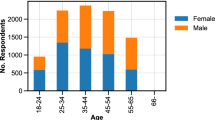Summary
This paper analyzes empirically the relationship between pay and performance. Economic and psychological theories predict that the design and implementation of a performance measurement and compensation system affect the motivation of employees. Our survey results demonstrate a positive relationship between the perceived characteristics of the complete compensation system and extrinsic motivation. Intrinsic motivation is not affected by the design of monetary compensation, but by promotion opportunities. The compensation system also significantly affects work satisfaction and turnover intent. Our results have both managerial as well as policy implications.
Similar content being viewed by others
References
V. Anderhub S. Gächter M. Königstein (2002) ArticleTitle‘Efficient Contracting and Fair Play in a Simple Principal-Agent Experiment,’ Experimental Economics 5 5–27 Occurrence Handle10.1023/A:1016380207200
G.P. Baker (2002) ArticleTitle‘Distortion and Risk in Optimal Incentive Contracts,’ Journal of Human Resources 37 728–751
R. Bénabou J. Tirole (2003) ArticleTitle‘Intrinsic and Extrinsic Motivation,’ Review of Economic Studies 70 489–520
B.J. Calder B.M. Staw (1975) ArticleTitle‘Self-Perception of Intrinsic and Extrinsic Motivation,’ Journal of Personality and Social Psychology 31 599–605
CPB (2003), ‘Performance Contracts for Police Forces,’ CPB Document 31.
CPB (2004), ‘Prestatieprikkels in het Nederlandse Onderwijs: Wat Kunnen We Leren van Recente Buitenlandse Ervaringen?,’ CPB Document 49.
E.L. Deci (1975) Intrinsic Motivation Plenum Press New York and London
E.L. Deci R.M. Ryan (1985) Intrinsic Motivation and Self-Determination in Human Behavior Plenum Press New York and London
Dohmen, T.J. (2003), ‘A Theory of Careers in Hierarchical Internal Labor Markets,’ Working Paper.
R.G. Ehrenberg M.L. Bognanno (1990) ArticleTitle‘The Incentive Effects of Tournaments Revisited: Evidence from the European PGA Tour,’ Industrial and Labor Relations Review 43 74–88
R. Eisenberger J. Cameron (1996) ArticleTitle‘Detrimental Effects of Reward: Reality or Myth?’ The American Psychologist 51 1153–1166
R. Eisenberger L. Rhoades J. Cameron (1999) ArticleTitle‘Does Pay for Performance Increase or Decrease Perceived Self-Determination and Intrinsic Motivation?’ Journal of Personality and Social Psychology 77 1026–1040 Occurrence Handle10.1037/0022-3514.77.5.1026
E.F. Fama (1980) ArticleTitle‘Agency Problems and the Theory of the Firm,’ Journal of Political Economy 88 288–307
E. Fehr S. Gächter (2000) ArticleTitle‘Fairness and Retaliation: The Economics of Reciprocity,’ Journal of Economic Perspectives 14 159–181 Occurrence Handle10.1257/jep.14.3.159
B.S. Frey (1997) Not Just for the Money. An Economic Theory of Personal Motivation Edward Elgar Publishing Ltd Cheltenham, UK
B.S. Frey (2002) ArticleTitle‘Creativity, Government and the Arts,’ De Economist 150 363–376 Occurrence Handle10.1023/A:1020128016113
B.S. Frey F. Oberholzer-Gee (1997) ArticleTitle‘The Cost of Price Incentives: An Empirical Analysis of Motivation Crowding-Out,’ The American Economic Review 87 746–755
B.S. Frey R. Jegen (2001) ArticleTitle‘Motivation Crowding Theory: A Survey of Empirical Evidence,’ Journal of Economic Surveys 15 589–611 Occurrence Handle10.1111/1467-6419.00150
R. Gibbons (1998) ArticleTitle‘Incentives in Organizations,’ Journal of Economic Perspectives 12 115–132
The Human Capital Group (2004), ‘Nationale Beloningsmonitor 2004’.
O. Janssen (2001) ArticleTitle‘Fairness Perceptions as a Moderator in the Curvilinear Relationships between Job Demands, and Job Performance and Job Satisfaction,’ Academy of Management Journal 44 1039–1050
M.C. Jensen (1994) ArticleTitle‘Self-Interest, Altruism, Incentives, and Agency Theory,’ Journal of Applied Corporate Finance 7 40–45
M.C. Jensen W.H. Meckling (1976) ArticleTitle‘Theory of the Firm: Managerial Behavior, Agency Costs and Ownership Structure,’ Journal of Financial Economics 37 305–360
D.M. Kreps (1997) ArticleTitle‘Intrinsic Motivation and Extrinsic Incentives,’ American Economic Review 87 359–364
A.H. Kunz D. Pfaff (2002) ArticleTitle‘Agency theory, performance evaluation and the hypothetical construct of intrinsic motivation,’ Accounting, Organizations and Society 27 275–295 Occurrence Handle10.1016/S0361-3682(01)00031-9
M.C. Langedijk P.M.L. Ykema-Weinen (2000) Belonen in Strategisch Perspectief Van Gorcum/Stichting Management Studies Assen Kon
E.E. Lawler (1987) ‘The Design of Effective Reward Systems,’ J.W. Lorsch (Eds) Handbook of Organizational Behavior Prentice-Hall Englewood Cliffs, NJ 255–271
E.P. Lazear S. Rosen (1981) ArticleTitle‘Rank-Order Tournaments as Optimum Labor Contracts,’ Journal of Political Economy 89 841–864
E. A. Locke D. Henne (1986) ‘Work Motivation Theories,’ C. L. Cooper I. T. Robertson (Eds) International Review of Industrial and Organizational Psychology Wiley Chichester, UK 1–35
OECD (2004), ‘Economic Survey – Netherlands 2004’.
M. Osterloh B.S Frey (2000) ArticleTitle‘Motivation, Knowledge Transfer, and Organizational Forms,’ Organization Science 11 538–550 Occurrence Handle10.1287/orsc.11.5.538.15204
C. Prendergast (1999) ArticleTitle‘The Provision of Incentives in Firms,’ Journal of Economic Literature 37 7–63
H. Thierry (1987) ArticleTitle‘Payment by Result Systems: A Review of Research 1945–1985,’ Applied Psychology 36 91–108
Van Herpen, M.F.M., K. Cools, and C.M. Van Praag (2005), ‘Wage Structure and the Incentive Effect of Promotions’ Working Paper.
Author information
Authors and Affiliations
Corresponding author
Additional information
We would like to thank the organization and the participants of the 2002 conference of the Performance Measurement Association in Boston for helpful discussions and also seminar participants of the Dutch Labor Market Conference. We are grateful for the comments provided by Bruno S. Frey. The paper has also significantly benefited from the suggestions and comments of two anonymous referees.
Rights and permissions
About this article
Cite this article
Van Herpen, M., Van Praag, M. & Cools, K. The Effects of Performance Measurement and Compensation on Motivation: An Empirical Study. De Economist 153, 303–329 (2005). https://doi.org/10.1007/s10645-005-1990-z
Issue Date:
DOI: https://doi.org/10.1007/s10645-005-1990-z




